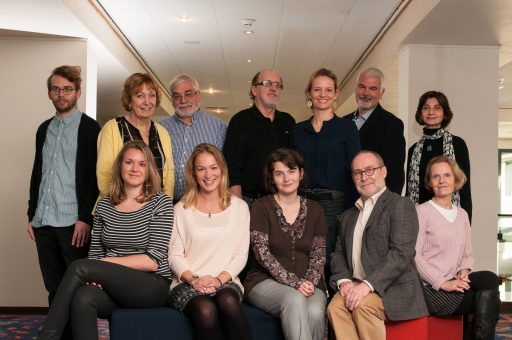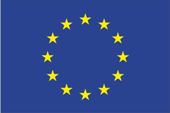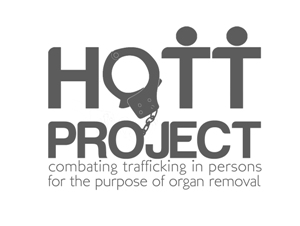The HOTT Project
combating trafficking in human beings for the purpose of organ removal
The HOTT project addressed a new and neglected form of trafficking in human beings: trafficking in persons for the purpose of organ removal. The project ran from 2012 until 2016 and was the first project addressing this crime to receive funding from the European Commission. Its aims were to increase knowledge, raise awareness and improve nonlegislative responses to this crime.
Transplantation is becoming a victim of its own success, with demand for organs far outpacing supply. Under the circumstances of this alarming, increasing organ scarcity, desperate individuals seek strategies to obtain organs from outside their home countries. With organs’ increased value comes their increased potential profitability, fuelling desire with people to trade, traffic and sell.
Many countries have implemented proper anti-organ trafficking legislation, however the level of information available to judicial and law enforcement authorities on the incidence of this crime, and its non-legislative response, is practically nonexistent. This action aimed to develop a structured and effective European action to increase awareness and improve the enforcement of trafficking in human beings for the purpose of organ removal.
The HOTT project was an initiative by Erasmus MC's Dpt. of Nephrology and Kidney Transplantation in Rotterdam (The Netherlands) that led the project in close collaboration with Lund University (Sweden), the Bulgarian Center for Bioethics (Bulgaria) and the Academic Society for the Research of Religions (Romania).
These institutions were supported by a group of associated partners and advisors including the European Society for Organ Transplantation (ESOT), the European Platform on Ethical, Legal and Psychosocial aspects of Transplantation (ELPAT), University Sts Cyril and Methodius (Skopje, North Macedonia), the Dutch National Police, Europol, the United Nations Office on Drugs and Crime (UNODC) and Eurotransplant.
The HOTT project was funded by the Prevention of and Fight against Crime Programme of the European Commission Directorate General Home Affairs, under the project, ‘Combating trafficking in persons for the purpose of organ removal’. Grant no. 4000002186; 2012–2016.
activities and reports
The HOTT project was structured into 3 studies: a comprehensive literature review covering the entire organ trade chain; an interview-study amongst patients who had purchased kidneys abroad; criminal case studies in Israel, Kosovo, South Africa, the USA and the UK. These studies resulted in 3 reports:
- Pascalev, A., de Jong, J., Ambagtsheer, F., Lundin, S., Ivanovski, N., Codreanu, C., Weimar, W. (2016). Trafficking in Human Beings for the Purpose of Organ Removal - A Comprehensive Literature Review
- Ambagtsheer, F., Gunnarson, M., van Balen, L., Ivanovski, N., Lundin, S., Byström, I., & Weimar, W. (Producer). (2014). Organ recipients who paid for kidney transplants abroad: a report.
- Ambagtsheer, F., Gunnarson, M., De Jong, J., Lundin, S., van Balen, L., Orr, Z., Weimar, W. (2016). Trafficking in Human Beings for the Purpose of Organ Removal - A Case Study Report
In addition, an expert meeting and international symposium was organized at Europol HQs in The Hague, The Netherlands where recommendations and indicators were developed:
- Caulfield, T., Duijst, W., Bos, M., Chassis, I., Codreanu, I., Danovitch, G., Shin, M. (2016). Trafficking in human beings for the purpose of organ removal and the ethical and legal obligations of healthcare providers.
- Pascalev, A., Van Assche, K., Sandor, J., Codreanu, N., Naqvi, A., Gunnarson, M., Yankov, J. (2016). Protection of human beings trafficked for the purpose of organ removal.
- Holmes, P., Rijken, C., D'Orsi, S., Hol, F., Gallagher, A., Greenberg, G., Forsythe, J. (2016). Establishing trafficking in human beings for the purpose of organ removal and improving cross-border collaboration in criminal cases.
- Capron, A. M., Muller, E., Erlich, G., John, M., Bienstock, R. E., McCarren, M., Yankov, J. (2016). Stimulating and Enhancing Partnerships Between Transplant Professionals and Law Enforcement: Recommendations.
- De Jong, J., & Ambagtsheer, F. (2016). Indicators to Identify Trafficking in Human Beings for the Purpose of Organ Removal.
These reports are published in: Ambagtsheer, F., & Weimar, W. (Eds.). (2016). Trafficking in Human Beings for the Purpose of Organ Removal: Results and Recommendations. Lengerich: Pabst Science Publishers. This book can be ordered here.
scientific output
PhD theses
- De Jong, J. (2017). Human trafficking for the purpose of organ removal. Utrecht University. Download here
- Ambagtsheer, F. (2017). Organ Trade. Erasmus University Rotterdam. Download here
Books:
- Lundin, S. (2016). Organs for Sale: An Ethnographic Examination of the International Organ Trade: Springer.
- Ambagtsheer, F., & Weimar, W. (Eds.). (2016). Trafficking in Human Beings for the Purpose of Organ Removal: Results and Recommendations. Lengerich: Pabst Science Publishers.
Scientific articles and book chapters
- Ambagtsheer, F. & Bugter, R. (2022) The organization of the human organ trade: a comparative crime script analysis. Crime, Law and Social Change. Open access
- Doosje, H., Ambagtsheer, F. and Blokland, A. (2021) Criminele netwerken achter orgaanhandel: een sociale netwerkanalyse van de Medicus-zaak. Tijdschrift voor Criminologie, Vol. 63(3), pp. 292-311.
- Ambagtsheer, F. (2021). Understanding the challenges to investigating and prosecuting organ trafficking: a comparative analysis of two cases. Trends in organized crime, 1-28. Open access.
- Ambagtsheer, F., & Van Balen, L. (2020). ‘I’m not Sherlock Holmes’: Suspicions, secrecy and silence of transplant professionals in the human organ trade. European Journal of Criminology, 17(6), 764–783. Open access.
- Ambagtsheer, F. (2019). Combating human trafficking for the purpose of organ removal: lessons learned from prosecuting criminal cases. In J. A. Winterdyk & J. Jones (Eds.), The Palgrave International Handbook of Human Trafficking. Cham Palgrave Macmillan.
- Caulfield, T., Duijst, W., Bos, M., Chassis, I., Codreanu, I., Danovitch, G., Shin, M. (2016). Trafficking in human beings for the purpose of organ removal and the ethical and legal obligations of healthcare providers. Transplant Direct, 2(2), e60.
- Pascalev, A., Van Assche, K., Sandor, J., Codreanu, N., Naqvi, A., Gunnarson, M., Yankov, J. (2016). Protection of human beings trafficked for the purpose of organ removal. Transplantation Direct, 2(2), e59.
- Holmes, P., Rijken, C., D'Orsi, S., Hol, F., Gallagher, A., Greenberg, G., Forsythe, J. (2016). Establishing trafficking in human beings for the purpose of organ removal and improving cross-border collaboration in criminal cases. Transplant Direct, 2(2), e58.
- Capron, A. M., Muller, E., Erlich, G., John, M., Bienstock, R. E., McCarren, M., Yankov, J. (2016). Stimulating and Enhancing Partnerships Between Transplant Professionals and Law Enforcement: Recommendations. Transplant. Direct., 2(2).
- De Jong, J., & Ambagtsheer, F. (2016). Indicators to Identify Trafficking in Human Beings for the Purpose of Organ Removal. Transplantation Direct, 2(2), e56. doi:10.1097/txd.0000000000000568
- Ambagtsheer, F., & Weimar, W. (2016). The Hague Recommendations: Improving Nonlegislative Responses to Trafficking in Human Beings for the Purpose of Organ Removal. Transplant Direct, 2(2), e61.
- Ambagtsheer, F., De Jong, J., Bramer, W. M., & Weimar, W. (2016). On patients who purchase organ transplants abroad. American Journal of Transplantation, 16(10), 2800-2815. doi:10.1111/ajt.13766
- Ambagtsheer, F., & Weimar, W. (2016). Organ trade: Knowledge, awareness, and nonlegislative responses. Transplantation, 100(1), 5-6.
- Van Balen, L. J., Ambagtsheer, F., Ivanovski, N., & Weimar, W. (2016). Interviews With Patients Who Traveled From Macedonia/Kosovo, The Netherlands, and Sweden for Paid Kidney Transplantations. Progress in Transplantation, 26(4), 328-334. doi:10.1177/1526924816667951
- Gunnarson, M., & Lundin, S. (2015). The Complexities of Victimhood: Insights from the Organ Trade. Somatechnics, 5(1), 32-51. doi:doi:10.3366/soma.2015.0146
- Ambagtsheer, F., van Balen, L. J., Duijst-Heesters, W. L. J. M., Massey, E. K., & Weimar, W. (2015). Reporting organ trafficking networks: a survey-based plea to breach the secrecy oath. American Journal of Transplantation, 15(7), 1759-1767.



